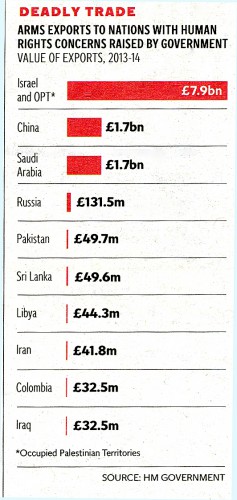The Independent Wednesday 23 July 2014 Cahal Milmo

The Government was accused of double standards in its calls for tough sanctions against Russia last night, after it emerged that British officials have approved a massive increase in weaponry to be sold to Moscow.
MPs warn today that at least 251 export licences for the sale of controlled goods – ranging from sniper rifles to night sights – remain in place despite a call from David Cameron for other countries, in particular France, to halt lucrative arms deals with the Russians.
A powerful committee of MPs is calling on the Government to show “more cautious judgement” when approving exports to Russia after the value of licences rocketed by more than half in the past year from £86m to £131.5m.
The increase of 52 percent in the past 12 months took place despite the UK’s increasingly strident criticism of Russia’s support – including the supply of arms – for pro-Moscow separatist rebels in eastern Ukraine, who have now been blamed for the missile attack thought to have killed all 298 people on board Malaysia Airlines Flight MH17.
As the European Union announced it was considering targeting defence sales as part of widened sanctions against Moscow, Labour claimed the Conservative Party had also accepted donations, worth more than £900,000 since 2007, from Russians with alleged links to the Russian government.
The disclosures are embarrassing for Mr Cameron who singled out French President François Hollande’s refusal to call off a £1bn deal to sell Moscow two helicopter carriers. Yesterday a close ally of President Hollande called Mr Cameron a “hypocrite” over Britain’s links to Russia.
Downing Street insisted that any arms licences granted for equipment specifically for the Russian military had been suspended in the wake of the MH17 outrage, but the majority of remaining licences for hundreds of “dual-use” controlled goods remain.
The report by MPs on sales to 28 countries deemed by the Government to be “of human rights concern” found that last year Britain issued 285 separate licences for the sale of weaponry and controlled goods to Russia, including £1.6m of small arms ammunition, 38 sniper rifles, components for assault rifles and combat shotguns, and cryptography equipment worth £74m.
A five-year licence was also granted by the Department for Business, Innovation and Skills (BIS) for the shipping of multiple militarycomponents, including missile components and launching technology, to Russian territory.
Last night officials in Business Secretary Vince Cable’s department insisted that the licence applied to a contingency agreement to supply emergency spare parts to the Brazilian navy in 23 countries, including Russia, and no missile parts had been sent to Russia under the deal.
But MPs ask if there were enough checks to ensure that a long list of weaponry approved for export to Russia reached its declared end user. They said Britain needed to be significantly more circumspect about what it agreed to sell to authoritarian countries.
Sir John Stanley, chairman of the Commons Committees on Arms Export Controls (CAEC), said: “Our view is that there should be a more cautious approach. We have been appealing for a more considered approach to Russia for some time. I think many people would be wondering why the UK is giving export approval to the considerable number of items on that list.”
The senior Conservative MP said that he would be writing to Mr Cameron for clarification on which further weapons exports to Russia have now been banned amid criticism from anti-arms trade campaigners that Britain was only taking action because of the international outcry over the MH17 atrocity.
Andrew Smith, from the Campaign Against Arms Trade, said: “All too often it takes a humanitarian catastrophe before the UK Government practises arms control. We welcome tighter regulation of the arms trade, but when the UK’s target markets include oppressive governments, it doesn’t just give them military support, it also indicates political support.”
Former Foreign Secretary William Hague announced in March that Britain was suspending all existing licences and applications of military and dual-use equipment to Russia where it was or could be used against Ukraine.
Sir John said this had resulted in the suspension of the “relatively small number” of just 34 of the 285 approved sales to Russia. The Government insisted that the “majority” of remaining export licences for Russia applied to items for “commercial use”.
The annual report by the MPs, based on joint meetings of four separate Commons select committees, also accused Mr Cable of quietly dropping a long-standing plank of Britain’s arms export policy to make sales to oppressive regimes easier.
The report found that the Government last year approved sales worth £11.9bn to 28 countries designated by the Foreign and Commonwealth Office (FCO) as being “of human rights concern”, including £1.7bn each to Saudi Arabia and China.
Sales to Israel, also named on the FCO list, were dominated bya single deal –worth £7.8bn – of cryptographic equipment and software to an unnamed customer in the country.
Since 2000, arms sales had been considered alongside criteria which state: “An export licence will not be issued if the arguments for doing so are outweighed … by concern that the goods might be used for internal repression or international aggression”.
BIS officials insisted that safeguards remained in place. But Sir John disputed this, saying it was clear the policy had been changed.
The MPs on the select committee were also strongly critical of the current government and its Labour predecessor for approving the sale of chemical weapon precursors to Syria despite the knowledge that the country’s regime was developing a nerve-gas stockpile.
A government spokesman said: “The UK aims to operate one of the most robust and transparent export control systems in the world. Every application is examined rigorously against internationally recognised criteria and particular attention is paid to human rights risks.”
